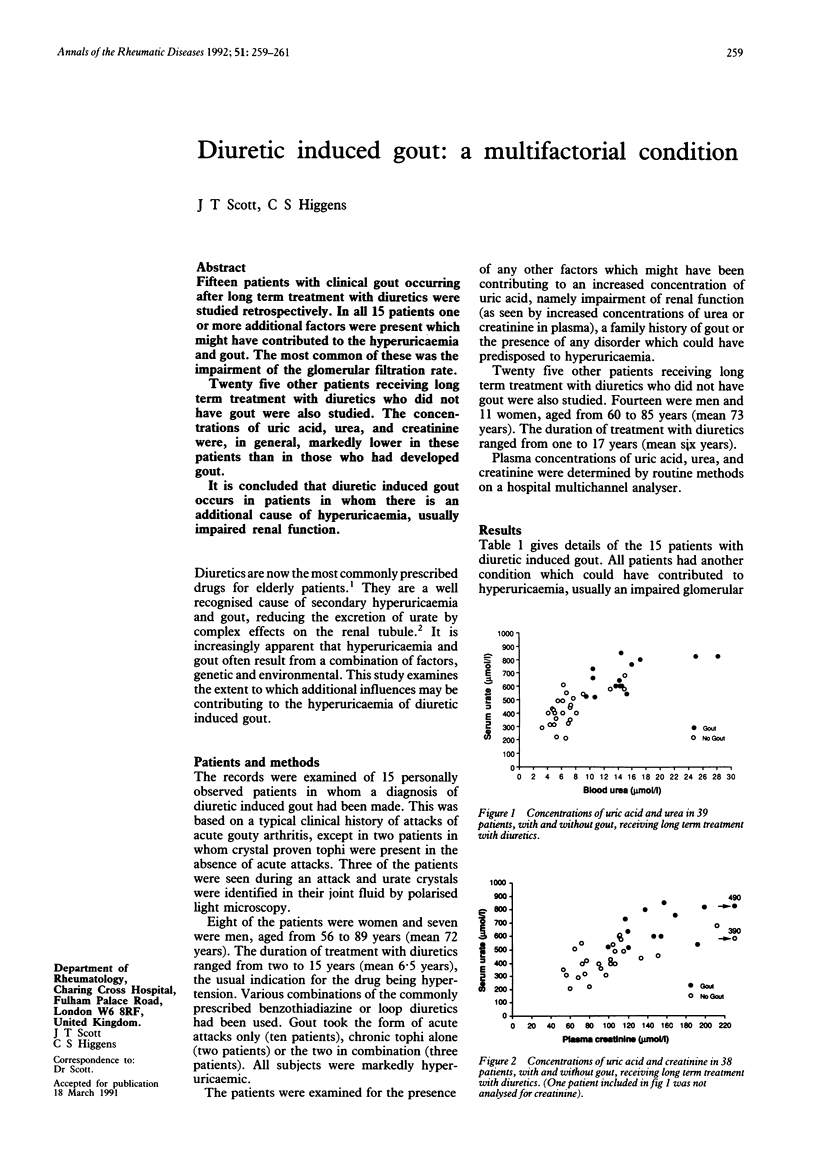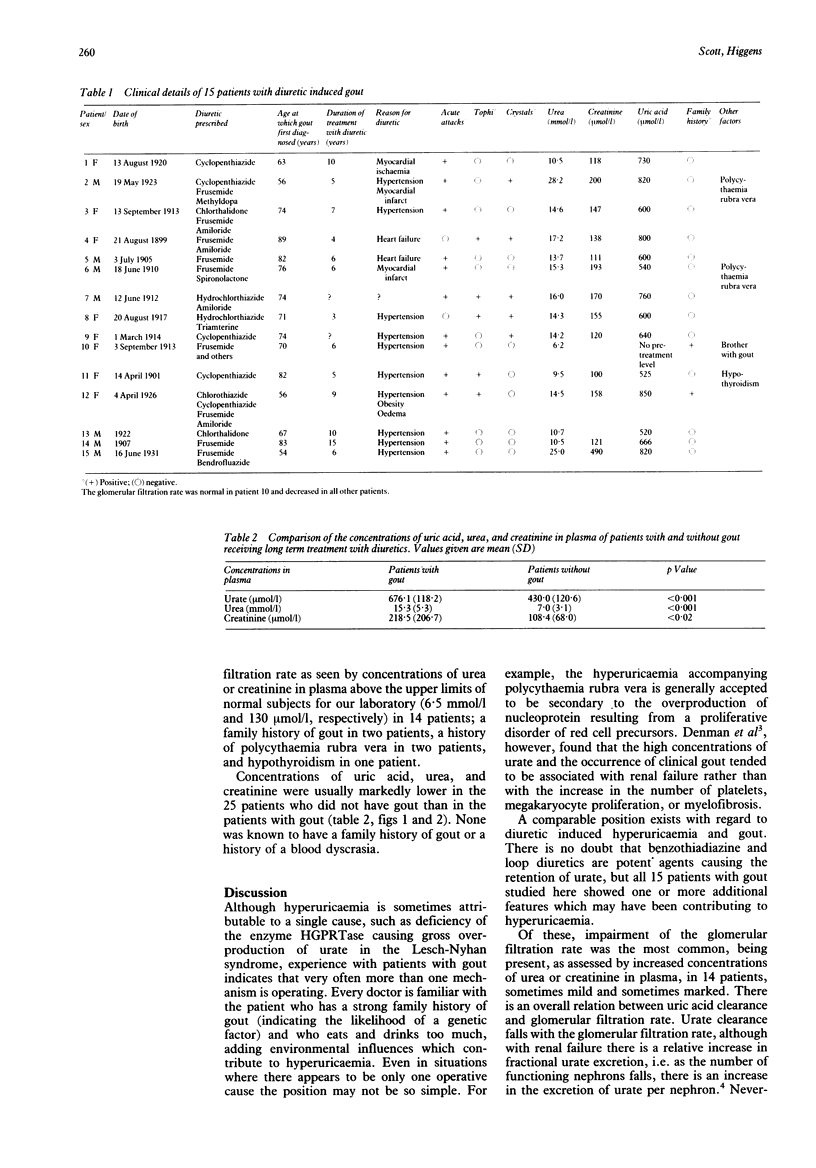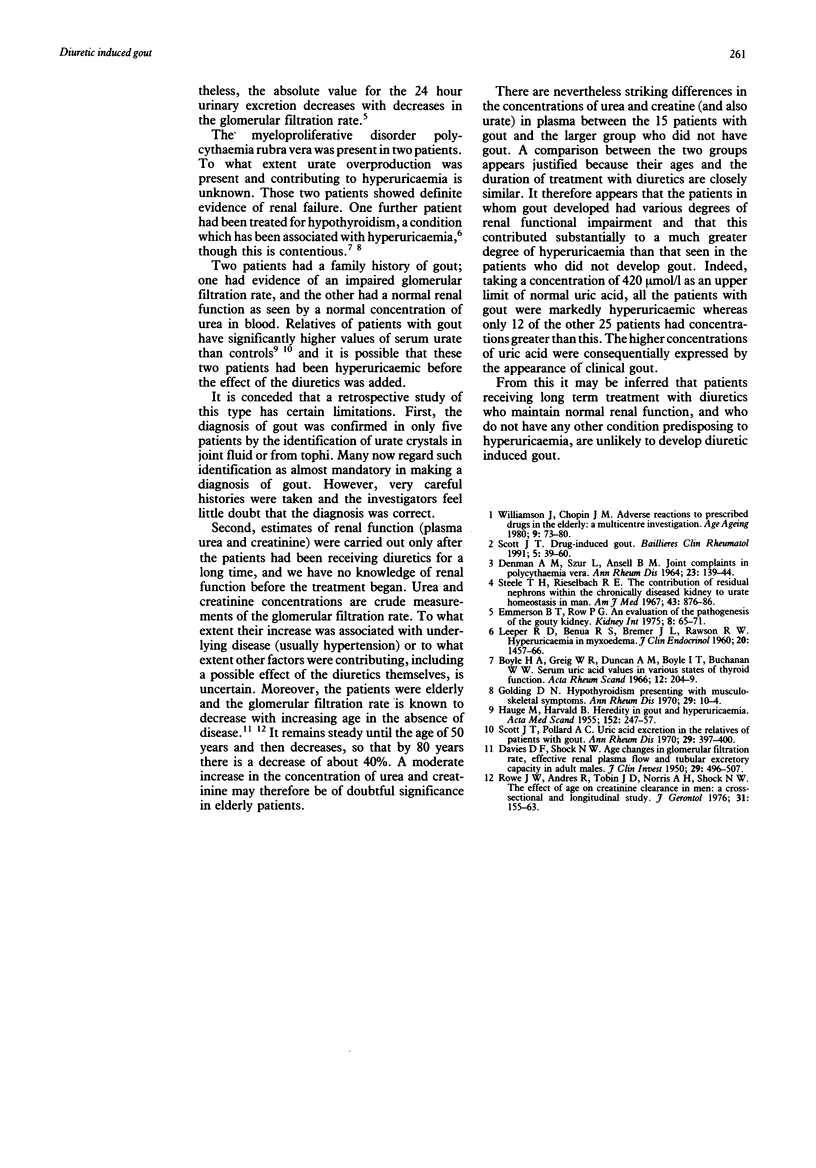Abstract
Fifteen patients with clinical gout occurring after long term treatment with diuretics were studied retrospectively. In all 15 patients one or more additional factors were present which might have contributed to the hyperuricaemia and gout. The most common of these was the impairment of the glomerular filtration rate. Twenty five other patients receiving long term treatment with diuretics who did not have gout were also studied. The concentrations of uric acid, urea, and creatinine were, in general, markedly lower in these patients than in those who had developed gout. It is concluded that diuretic induced gout occurs in patients in whom there is an additional cause of hyperuricaemia, usually impaired renal function.
Full text
PDF


Selected References
These references are in PubMed. This may not be the complete list of references from this article.
- Boyle J. A., Greig W. R., Duncan A. M., Boyle I. T., Buchanan W. W. Serum uric acid values in various states of thyroid function. Acta Rheumatol Scand. 1966;12(3):204–209. doi: 10.3109/rhe1.1966.12.issue-1-4.24. [DOI] [PubMed] [Google Scholar]
- DAVIES D. F., SHOCK N. W. Age changes in glomerular filtration rate, effective renal plasma flow, and tubular excretory capacity in adult males. J Clin Invest. 1950 May;29(5):496–507. doi: 10.1172/JCI102286. [DOI] [PMC free article] [PubMed] [Google Scholar]
- DENMAN A. M., SZUR L., ANSELL B. M. JOINT COMPLAINTS IN POLYCYTHAEMIA VERA. Ann Rheum Dis. 1964 Mar;23:139–144. doi: 10.1136/ard.23.2.139. [DOI] [PMC free article] [PubMed] [Google Scholar]
- Emmerson B. T., Row P. G. Editorial: An evaluation of the pathogenesis of gouty kidney. Kidney Int. 1975 Aug;8(2):65–71. doi: 10.1038/ki.1975.81. [DOI] [PubMed] [Google Scholar]
- Golding D. N. Hypothyroidism presenting with musculoskeletal symptoms. Ann Rheum Dis. 1970 Jan;29(1):10–14. doi: 10.1136/ard.29.1.10. [DOI] [PMC free article] [PubMed] [Google Scholar]
- HAUGE M., HARVALD B. Heredity in gout and hyperuricemia. Acta Med Scand. 1955 Nov 10;152(4):247–257. doi: 10.1111/j.0954-6820.1955.tb03485.x. [DOI] [PubMed] [Google Scholar]
- LEEPER R. D., BENUA R. S., BRENER J. L., RAWSON R. W. Hyperuricemia in myxedema. J Clin Endocrinol Metab. 1960 Nov;20:1457–1466. doi: 10.1210/jcem-20-11-1457. [DOI] [PubMed] [Google Scholar]
- Rowe J. W., Andres R., Tobin J. D., Norris A. H., Shock N. W. The effect of age on creatinine clearance in men: a cross-sectional and longitudinal study. J Gerontol. 1976 Mar;31(2):155–163. doi: 10.1093/geronj/31.2.155. [DOI] [PubMed] [Google Scholar]
- Scott J. T. Drug-induced gout. Baillieres Clin Rheumatol. 1991 Apr;5(1):39–60. doi: 10.1016/s0950-3579(05)80295-x. [DOI] [PubMed] [Google Scholar]
- Scott J. T., Pollard A. C. Uric acid excretion in the relatives of patients with gout. Ann Rheum Dis. 1970 Jul;29(4):397–400. doi: 10.1136/ard.29.4.397. [DOI] [PMC free article] [PubMed] [Google Scholar]
- Steele T. H., Rieselbach R. E. The contribution of residual nephrons within the chronically diseased kidney to urate homeostasis in man. Am J Med. 1967 Dec;43(6):876–886. doi: 10.1016/0002-9343(67)90246-x. [DOI] [PubMed] [Google Scholar]
- Williamson J., Chopin J. M. Adverse reactions to prescribed drugs in the elderly: a multicentre investigation. Age Ageing. 1980 May;9(2):73–80. doi: 10.1093/ageing/9.2.73. [DOI] [PubMed] [Google Scholar]


